Work from home? Starting a side hustle? This is the only map and guide you'll ever need.
(Skip to the listings
here)
D.C.’s coworking scene is halfway through its teen years, and puberty is rough.
The longest continually operating coworking space in the District — and arguably in the world — recently closed its doors after a potential new owner couldn’t get the landlord to come to terms on a new lease.
Coworking provides physical office-like space to members whose sole proprietorships or small businesses would otherwise leave them working from home or coffee shops. Some spaces focus on a business niche, like tech startups or nonprofits, while others open the doors to anyone who can stoke the creative fires that keep these places popular.
Wifi access and desk space are common amenities, while many offer conference rooms for rent, couches for brainstorming and evening events or speaker sessions. Some focus more on providing affordable office space for small-staffed companies while a new breed of space is trying to compete with neighborhood coffee shops for casual coworkers.
Many of the members from the now defunct Affinity Lab, which opened in 2001 along the U Street Corridor, have “banded together” and relocated at WeWork locations, says Mike LaRosa, a coworking consultant who tried to purchase Affinity Labs late last year.
“I was trying to take on a business in debt and make up for the back rent,” says LaRosa, who also produces the Global Coworking Unworking Conference (GCUC) and thinks the landowner simply wanted to redevelop the Affinity Lab property.
The way that members of that space fought for its survival, he says, reflects the kind of camaraderie that can accompany old-school coworking. Martin Ringlein of Canvas Co/work says that breed of coworking is still going strong in the District, even as national coworking chains have come onto the scene and exponentially grown the number of coworking desks available.
His own facility was recently acquired by HZDG, a regional coworking brand with offices in Rockville, Baltimore and New York that will also locate its District employees in the space. Ringlein says the change will be mutually beneficial.
“HZ has the resources and passion that take (our) mission to a new level,” he said in a press release. He added via email that it should be “business as usual” for members of the space, besides being able to tap into a broader network of business connections.
WorkDistrict, which opened in early 2013 as a home for startups interesting crowdfunding and code on 14th Street Northwest, appears to no longer be operational. The space’s
website no longer works and emails are returned. Its social media pages haven’t been updated since August.
These aren’t the only changes since we published our
first coworking guide in 2013. That year, the District welcomed some behemoths of coworking that have ballooned the number of coworking spaces in the city.
Spaces have been multiplying ever since.
The national coworking brand,
WeWork, came to town early last year and has since multiplied to three expansive spaces — think 33,000 square feet apiece. When
UberOffices opened its third space opened in Dupont Circle in the fall of 2013, its first in D.C., it was six times the square footage of any existing coworking space in the city. The local chain has since opened another location in Bethesda.
Another brand’s carving out its own definition of coworking,
Cove, is adding new spaces in the city at a dizzying pace. As of March, Cove will have nine spaces in the D.C. area, where, says founder Adam Segal, they aim to compete with coffee shops and couches to offer independents a “productive space” without the commitment of a traditional coworking arrangement.
“I still work from home and coffee shops, but I work from Cove when I want to be really productive and social,” Cove Founder Adam Segal says. “The average person comes in for a couple hours and then leaves.”
LaRosa, the coworking consultant, thinks the next four years will have a winnowing effect on D.C.’s coworking scene, “separating the wheat from the chaff” and revealing which coworking spaces are the best fit for the city.
“The successes we and others have had proved to be models for others such as WeWork and UberOffices to take a chance on Washington, D.C.,” Ringlein says.
The majority of coworkers still report a boost in creativity from joining a space and improvement in their standards of work, according to Deskmag’s annual surveys.
While coworking provides a place for business relationships to happen organically, the spaces are distinct from business incubators or creator spaces. Incubators like
1776, which opened in 2013, work closely with their occupants to mentor and grow the new businesses, often focusing on a specific business sector or industry. 1776, for example, does offer coworking space, but only to members selected for the incubator program, says Evan Burfield, cofounder of the space.
Makerspaces, where members can manufacture products, may be the next frontier of shared workspaces. The 16,000-square-foot
Ideaspace near the Navy Yard, which opened last year, sold out its first round of memberships in a week. That’s not to mention food-maker incubators, like the new Mess Hall and Union Kitchen, which is
opening a second space this year.
This list of coworking spaces in the heart of D.C. is one that’s sure to grow.
Prices and membership levels vary by location. Check out each space's website to learn more and to learn how to join.
Canvas Co/work
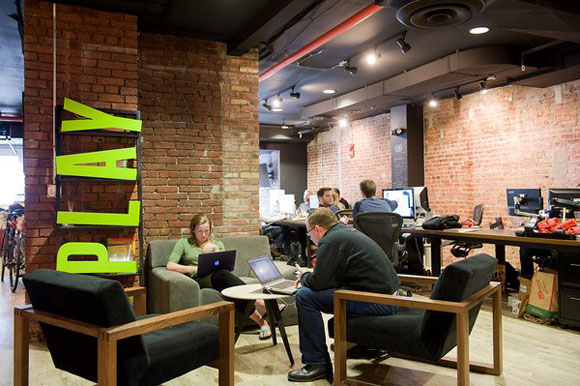
1203 19
th St. NW, 3
rd Floor, Dupont Circle
When Canvas Co/work opened its doors three years ago, D.C. still wasn’t used to this idea of “coworking.”
But what might be distractions to some — background music, ping pong tables and an Apple TV — are creativity inducers to the 75-some members who now call Canvas Co/work “the office.”
Other amenities include whiteboards for brainstorming, snacks and coffee (provided by a coffee startup in the space), Herman Miller chairs for comfort and dishwashers in the kitchen. Canvas also hosts events like
Startup Jackpot and houses several startups.
Canvas originally focused on attracting web designers and developers, since those were the fields of its founding business partners. But the 6,000-square-foot space now welcomes anyone who’s a good fit to its “motley crew” of creative individuals.
SmartThings, which eventually sold to Samsung for $220 million, started out with two employees and a desk here.
Cove
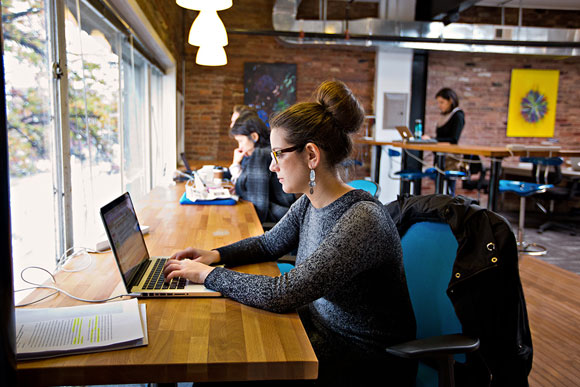
1730 Connecticut Avenue NW, Dupont Circle / 1624 14
th Street NW, 14
th Street / 611 ½ Pennsylvania Avenue SE, Capitol Hill / 1402 Meridian Place NW, Columbia Heights / 3128 M Street NW, Georgetown / 1817 M Street NW, South Dupont
Cove’s Founder Adam Segal says he intends for his new iteration of shared workspaces to compete with “your living room and coffee shops” for your work hours.
The first location opened in Dupont Circle in late 2014, followed quickly several more. Segal says there will be nine by the end of March, including a location in Old Town Alexandria.
Cove members don’t have a dedicated desk but use the space for a few hours here and there as they would a coffee shop — one where you’re encouraged to stay and work a while without having to buy more lattes. Members purchase a package of hours to use the space — 8 hours for $24 or 50 hours for $124 — and check in with their phones upon arrival.
At around $3 per hour, Cove is priced like a latte (an argument several coworking spaces have tried make in one form or another). Although, Segal is honest about the quality of the Keurig coffee offered at Cove.
“Our specialty isn’t coffee; it’s productivity,” he says, adding that Cove partners with nearby coffee shops to offer deals and, occasionally, in-house brews of a higher quality.
The Hive 2.0
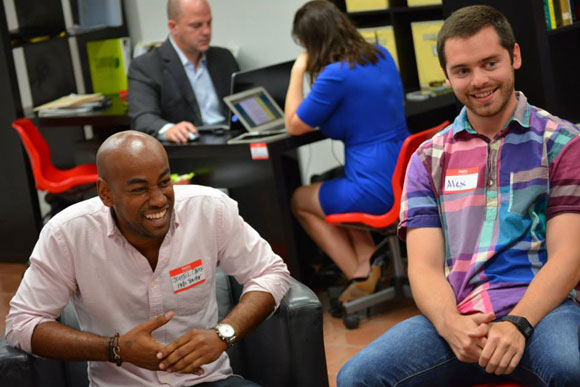
1231-B Good Hope Rd. SE, Anacostia
The Hive started in the fall of 2010 to not only provide a creative workspace to the Anacostia community but also to aid in its revitalization through arts, culture and small business development.
The
Arch Development Corporation that backs the Hive also runs art galleries and a digital print lab in the vicinity, with much of the neighborhood’s art displayed in the workspaces. The Hive was the result of a community meeting in which residents said they had to leave the area to find coworking or office spaces, former managing director Nikki Peele said when we interviewed her last year.
The space includes ‘round-the-clock access to the fully furnished offices as well as free technical assistance and workshops.
The Hive houses businesses as diverse as government contractors and nonprofits while fostering a “creative economy” for graphic designers and artists. Surrounded by a theater, coffee shops and art space, The Hive 2.0 is the only coworking space east of the Anacostia River, Peele said.
The founder of
Good Spread, Alex Cox, makes peanut butter for a good cause (or at least runs the company) out of the space.
Impact Hub DC
419 7th St NW, 2nd floor, Chinatown
The international coworking brand Impact Hub had plans to open one new location a month in 2014 — and one of them on D.C.’s 7th Street.
The location is now home to a thriving small business community — and Herman Miller ergonomic chairs — focused on social entrepreneurship and making positive changes both locally and internationally. The Impact Hub brand, now with more than 60 locations worldwide, is a certified B Corporation focused on meeting triple bottom lines, as are some of its members.
Members range from local food-focused entrepreneurs like Tom McDougall of 4P Foods to international rights groups like Darfur Women Action Group, according to its website.
Punchrock
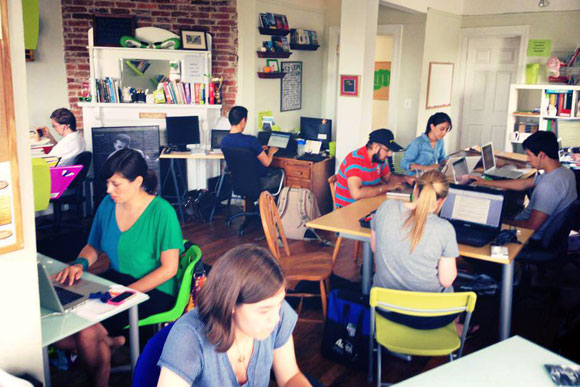
1800 Wyoming Ave NW, Adams Morgan
Punchrock launched its small space in Adams Morgan in the fall of 2012 with an eye for serving the businesses that are trying to change society. “Social innovators” is the niche market for this coworking space, and they’re not talking about businesses that use social media.
“Usually we define social entrepreneurs as those that are using their business to tackle societal issues,” says manager and founder of the space Roxie Alsruhe.
That includes businesses working within education, trying to fight hunger — and
one making cool sunglasses that come with a pair of prescription lenses for those in need.
Alsruhe says the space found a natural home in D.C., where many people land as NGOs, politicians or business owners to try to make a difference.
“We felt there wasn’t a space where all these players were meeting regularly,” Alsruhe says. “We wanted to fill that need and grow the field.”
Punchrock (a word that symbolizes challenging the status quo) includes about 15 business members and, often, a few office dogs. Alsruhe describes the space as looking “like a hostel” more than an office, with glass tables and markers for brainstorming in lieu of marker boards.
The space also offers hourly room rates and day passes for those who don’t like commitment.
UberOffices
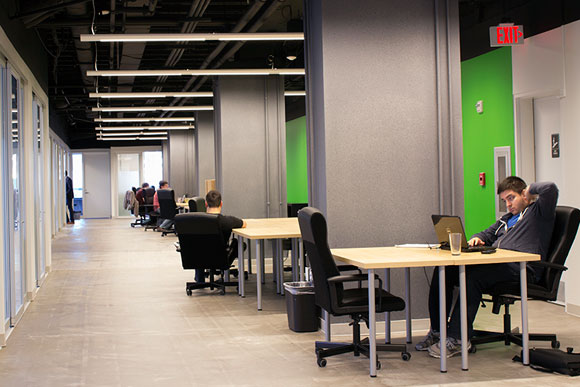
1200 18
th Street NW, Suite 700, Dupont Circle
UberOffices now has four locations in the region, adding a Bethesda base to its existing spaces in Rosslyn, Tysons Corner and Dupont Circle. Each is outfitted with exposed ceilings, concrete floors and glass walls for a modern-industrial look. Outdoor spaces like balconies or rooftop patios at the locations are a boon for after-work events.
Uber’s first space in Rosslyn sold out in less than two months, and the other two spaces are following suit, says cofounder Raymond Rahbar.
The company was the first to launch such large-scale coworking facilities in the District, with it’s Dupont Circle space offering two floors and 38,000 square feet of work space.
Though known for housing tech-minded startups like Tech Cocktail, Rahbar says UberOffice’s locations are open to “really anybody with an entrepreneurial outlook.”
The spaces focus on providing offices to small companies with fewer than a dozen employees as well as open desks for coworking individuals or groups. A tour of its Rosslyn facility shows (actual) coworkers sharing desks behind glass doors bearing their logos.
UberOffices began creating coworking spaces because real estate had been one of the “biggest pains” of starting businesses for its founders, Rahbar says.
“It was tough to be in a good space at a reasonable price with people that were like-minded. So we’re trying to combine everything in one,” Rahbar says.
WeWork

718 7
th Street NW, Chinatown / 641 S Street NW, Wonderbread Factory, Shaw / 1875 Connecticut Avenue NW, 3rd Floor, Dupont Circle
It says something about D.C.’s burgeoning coworking scene that this national network of shared workspaces wanted to come to town. WeWork runs spaces in 13 other major cities, including San Francisco and New York, London and Amsterdam, and saw in a trio of unique buildings the opportunity to come to the nation’s capital, says Carl Pierre, WeWork’s city lead.
The company specializes in finding and reviving spaces with character in cool neighborhoods — and it saw the first potential in Shaw and its former Wonderbread Factory.
“At first people said, ‘Really? Why Shaw?’ But there’s been a huge demand from people saying, ‘Oh yeah, I live right by there,” Pierre says.
After Wonderbread, WeWork added its Chinatown and, this past year, Dupont Circle locations to the menu, each of them sprawling and immaculately outfitted.
Desks at the space start at $400 a month and are held on a month-to-month basis, but WeWork’s private offices — starting at $525 a month and running up to $2,850 for six people — have become one of its niches. Overall, the spaces feature ornate kitchens and edgy wallpaper along with light fixtures and furniture straight out of a Soho apartment.
“We just want to do one thing really well and that’s create the perfect office environment for members to be successful,” Pierre says.
LaRosa referred to WeWork as “the gateway drug” of coworking, with a plethora of spaces available to introduce new audiences to the concept. The spaces are widely used by national and international companies that want to have a presence in the nation’s capital (and, while they’re at it, plush surroundings).
“It changes the way we perceive how people do business and work,” LaRosa says.
Due to a reporting error, this article originally omitted Impact Hub DC, a coworking space focused on social entrepreneurship. The article has been updated and Elevation DC regrets the omission.